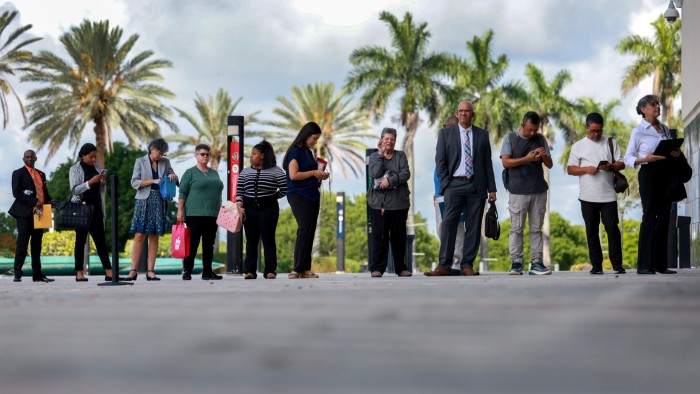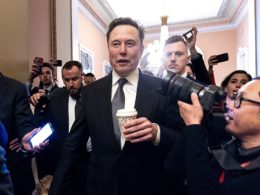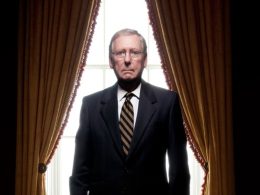The US workplace, from skyscrapers to factories, grew a little friendlier under President Joe Biden. But as Donald Trump rolls into the White House, that looks about to reverse.
The new president positions himself as more populist than past Republican administrations, with early appointments in some cases sympathetic to workers’ rights. But his anti-union rhetoric and tough campaign promises suggest his approach will favour employers over the rank and file.
Erik Gordon, a professor at the University of Michigan’s business school, said Trump would probably not be “loudly anti-union” but would strike “more of a tone of, ‘just suck it up . . . and stop complaining so much’”. That will go down well with business. “Many employers feel the pendulum had swung to the extent that you almost can’t ask your employees to work without it being some sort of violation of their rights.”
Does Trump have an agenda for labour and employment?
Trump’s political platform sets out a commitment to reviving US jobs.
90%of Democrats surveyed in a 2023 study by the Program for Public Consultation wanted to increase the federal minimum wage to $15 an hour — compared with 41% of Republican voters
It talks about the need to restore manufacturing roles, “save the American auto industry”, and eliminate taxes on tips earned by restaurant and hospitality workers. It says US workers will benefit from slashing regulation, “rebalancing trade” and curtailing illegal immigration.
Yet Trump is “not for the most part driven by ideology — it’s all feels”, according to Jason Kosnoski, a professor of political science at the University of Michigan-Flint. That makes policy more vulnerable to influence from “virulently anti-labour leaders like Elon Musk” that populate his circle. “If I had to bet, I would say of the people who have Trump’s ear, more of them are anti-labour than his pro-populist, somewhat labour-sympathetic inclination.”
How does Elon Musk fit into this?
Billionaire entrepreneur Elon Musk is emerging as an influential voice in the White House. He donated more than $250mn to Trump’s campaign and co-leads “the department of government efficiency”, a non-government advisory board, which aims to cut $2tn from the federal budget.
He has publicly opposed worker-friendly policies such as flexible working, diversity, equity and inclusion policies, and the right to form unions. Last year, he posted “DEI must DIE” on X, branding it discriminatory. He has eliminated remote work at his companies and criticised federal employees for working from home.
In an August conversation on X, Musk and Trump said employers should be allowed to fire striking workers, prompting United Auto Workers president Shawn Fain to call Trump a “scab”. Workers at Tesla, Musk’s car company, filed a labour complaint, alleging it fired them a day after they announced a union drive.
Worker advocates fear Trump may use the bully pulpit of the White House — and Musk, his closeness to it — to encourage employers to oppose unions, racial diversity policies and remote work. “That big unhappy sigh — I do that a lot these days,” said Judy Conti, government affairs director for the National Employment Law Project.
However, president of the International Longshoremen Association Harold Daggett last week credited Trump with helping the union reach a lucrative agreement with port operators and shipping lines to avert a strike that business leaders warned would upset the US economy.
The president-elect “demonstrated his unwavering support” for the dock workers’ union by calling the port operators and posting on Truth Social on their behalf last month, Daggett said.
What about other appointments?
One mechanism by which the new administration could weaken the power of workers is through changes to the National Labor Relations Board, the federal agency that protects workers’ right to organise and collectively bargain.
The agency is already facing challenges from Musk’s company SpaceX and several others. After the NLRB accused SpaceX of illegally firing employees last year, the company launched a lawsuit challenging the legitimacy of its processes in an attempt to neuter the board.
Conti said Trump’s greatest influence could come through appointments. Democrats are set to lose their majority on the board, making it more likely to rule in favour of employers and less active in enforcing worker protections. Trump is likely to replace Biden’s NLRB general counsel, Jennifer Abruzzo, with someone less committed to protecting workers’ right to organise.
“The board changes, you get a new GC . . . there’s going to be fewer protections for workers, and that’s going to raise the cost and risk of unions organising,” said Bob Bruno, a labour professor at the University of Illinois-Urbana-Champaign.
Could Trump fan the backlash against workplace DEI policies?
US companies embraced DEI initiatives such as anti-bias training or efforts to recruit minority staff following Black Lives Matter protests. But more recently, and in the face of conservative backlash, some have rowed back, cutting staff and funding.
Hostility to DEI in the Oval Office means companies that feel initiatives have “gone too far” may feel empowered to scale them back, Gordon said. “They will feel safer in doing that now.”
DEI departments within government may also be a target. In November, Vivek Ramaswamy, co-leader of Musk’s efficiency panel, criticised the Department of Health and Human Services for employing staffers dedicated to DEI and minority health, calling payroll costs “bloat” that needed to be cut.
While Ramaswamy’s role is only advisory, Y-Vonne Hutchinson, chief executive of workplace culture consultancy ReadySet, said she expected the administration “to try to ban [DEI policies] to the extent that they can” in federal government. They could, for example, dismantle DEI offices or ban federal contractors from offering training.
Conti added that the Equal Employment Opportunity Commission — the body responsible for enforcing anti-discrimination laws — could also shift its focus to so-called “reverse discrimination” against white men over other minorities and protected groups.
So why has Trump’s pick for labour secretary confused advocates for both employers and workers?
In November, Trump nominated representative Lori Chavez-DeRemer, an Oregon Republican, to head the US Department of Labor, which enforces laws related to wages and working conditions. She has spoken in support of workers’ rights to collective bargaining and voted in favour of the Protecting the Right to Organize Act, a bill making it easier for workers to unionise, which died in the Senate for lack of Republican support.

She has described her mission as supporting Trump’s “impressive efforts to remake the Republican party into the party of the American worker”. But her pro-union positions have rankled employer advocates. Mark Mix, president of the National Right to Work Committee, which campaigns for laws that allow workers to receive union-negotiated benefits without paying dues, said in a November letter she “should have no place in the Trump administration”.
How will threats to increase deportations affect the workforce?
Trump has set out plans to deport millions of undocumented workers, and his incoming “border tsar”, Tom Homan, told Fox News in November that worksite raids “have to happen”.
But employers warn the crackdown could have dire consequences for the US economy. The Center for Migration Studies estimated there were about 11.7mn undocumented people in the US in 2023. Business owners in agriculture and restaurants, where a significant share of workers are undocumented, have warned deportations will create mass labour shortages that leave business unable to function.
What about non-compete agreements?
About 30mn workers in the US are subject to non-compete agreements, contracts that restrict their ability to seek and accept better jobs. The Federal Trade Commission banned the agreements last April, but in August a federal court in Texas struck down the ban.
Trump’s FTC could appeal against that decision in an attempt to reinstate the ban. Conti said non-competes had dismayed worker advocates, libertarians and populist Republicans, “and usually where there are strange bedfellows, there can be some progress”.
But Abraham “Avi” Skoff, co-chair of the employment practice at law firm Moses Singer, said he expected the Trump administration to choose not to appeal.
“Republicans stand for the point of view that the federal government has over-reached and should cut back,” he said. “My expectation is that the appointments made by the Trump administration will reflect that view.”
Source link








